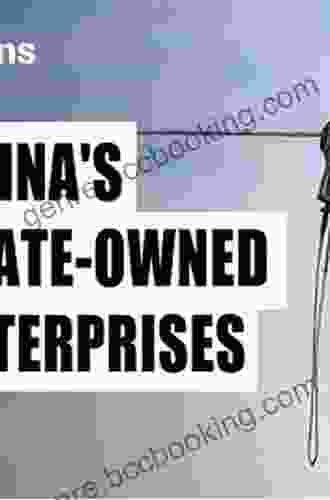Delving into the Political Economy of State-Owned Enterprises: A Comparative Analysis of China and India

State-owned enterprises (SOEs) have played a pivotal role in shaping the economic landscapes of China and India, two of the world's largest and most dynamic emerging economies. These behemoths, often wielding significant market power and political influence, have been at the forefront of both nations' industrialization and development efforts. However, their impact on the economy, governance, and societal well-being has been a subject of ongoing debate and academic inquiry.
This comprehensive article delves into the intricate tapestry of the political economy of SOEs in China and India, examining their historical evolution, ownership structures, governance mechanisms, economic performance, and broader implications for society. By juxtaposing these two contrasting models, we shed light on the complex dynamics and challenges associated with managing SOEs in rapidly transforming economies.
4.6 out of 5
| Language | : | English |
| File size | : | 4943 KB |
| Text-to-Speech | : | Enabled |
| Screen Reader | : | Supported |
| Enhanced typesetting | : | Enabled |
| Word Wise | : | Enabled |
| Print length | : | 293 pages |
Historical Evolution
China
The origins of SOEs in China can be traced back to the early 20th century, when the Nationalist government established state-owned companies to manage key industries such as mining, manufacturing, and transportation. After the Communist Revolution in 1949, SOEs became the dominant force in China's economy, with the government exercising direct control over all major industrial sectors.
During the reform era initiated by Deng Xiaoping in the late 1970s, SOEs underwent a series of market-oriented reforms aimed at improving their efficiency and profitability. However, despite these reforms, SOEs remained plagued by problems such as overstaffing, low productivity, and excessive government intervention.
India
In India, SOEs emerged after independence in 1947 as part of the government's strategy to promote industrialization and economic development. The government established SOEs in various sectors, including steel, mining, energy, and transportation. Over time, SOEs became major players in the Indian economy, accounting for a significant share of both output and employment.
Like China, India has also implemented reforms to improve the performance of its SOEs. These reforms have included privatization, deregulation, and the of market mechanisms. However, SOEs in India continue to face challenges, including political interference, bureaucratic inefficiencies, and a lack of accountability.
Ownership Structures
China
SOEs in China are owned by the state, with the central government holding the majority of shares in most large SOEs. The government exercises control over SOEs through various mechanisms, including the appointment of key executives and the issuance of directives. In recent years, the Chinese government has implemented a number of reforms to reduce direct government interference in SOEs and promote greater market discipline.
India
SOEs in India are owned by a mix of central and state governments. The central government owns a majority of shares in large SOEs, while state governments own controlling stakes in many smaller SOEs. The government exercises control over SOEs through a variety of means, including the appointment of boards of directors and the issuance of guidelines. In recent years, the Indian government has moved to privatize some SOEs and give others greater autonomy.
Governance Mechanisms
China
The governance of SOEs in China has been a complex and evolving process. In the past, SOEs were managed by government bureaucrats who lacked the necessary business expertise. This led to a number of problems, including inefficiencies, corruption, and a lack of accountability.
In recent years, the Chinese government has implemented a number of reforms to improve the governance of SOEs. These reforms have included the of independent directors to SOE boards, the establishment of performance-based compensation systems, and the of market discipline through stock market listings.
India
The governance of SOEs in India has also been characterized by a mix of state control and market mechanisms. In the past, SOEs were often managed by politicians and bureaucrats who lacked the necessary business skills. This led to many of the same problems that plagued SOEs in China, such as inefficiencies, corruption, and a lack of accountability.
In recent years, the Indian government has taken steps to improve the governance of SOEs. These steps have included the of independent directors to SOE boards, the creation of performance-based compensation systems, and the implementation of right to information laws.
Economic Performance
China
The economic performance of SOEs in China has been mixed. Some SOEs have been very successful, while others have struggled to compete in a market economy. The overall profitability of SOEs has declined in recent years, due to a number of factors, including increased competition, rising labor costs, and environmental regulations.
Despite these challenges, SOEs continue to play a significant role in the Chinese economy. They account for a substantial share of output and investment, and they employ a large number of workers. SOEs also play a key role in providing essential services, such as energy, transportation, and telecommunications.
India
The economic performance of SOEs in India has also been mixed. Some SOEs have been successful in generating profits and contributing to economic growth. However, many others have struggled to compete in a market economy and have become a drain on the government budget.
In recent years, the Indian government has been implementing a number of reforms to improve the performance of its SOEs. These reforms have included privatization, deregulation, and the of market mechanisms. However, SOEs in India continue to face challenges, including political interference, bureaucratic inefficiencies, and a lack of accountability.
Social Implications
The rapid growth of SOEs in China and India has had a significant impact on society. On the one hand, SOEs have created jobs and contributed to economic growth. On the other hand, SOEs have also been criticized for their environmental pollution, labor abuses, and political influence. Therefore, managing the political economy of SOEs in a sustainable and equitable manner poses a complex challenge for policymakers in both countries.
The political economy of SOEs in China and India is a complex and evolving phenomenon. These state-owned behemoths have played a significant role in shaping the economic landscapes of both nations, but their impact on governance, economic performance, and societal well-being has been a subject of ongoing debate. By delving into the intricate dynamics of SOE ownership, governance, and performance, we can gain a deeper understanding of the challenges and opportunities associated with managing these powerful entities in rapidly transforming economies.
As China and India continue to develop, the role of SOEs will likely continue to evolve. It is imperative that policymakers in both countries carefully consider the complex implications of SOEs and strive to implement reforms that promote economic efficiency, social equity, and environmental sustainability.
4.6 out of 5
| Language | : | English |
| File size | : | 4943 KB |
| Text-to-Speech | : | Enabled |
| Screen Reader | : | Supported |
| Enhanced typesetting | : | Enabled |
| Word Wise | : | Enabled |
| Print length | : | 293 pages |
Do you want to contribute by writing guest posts on this blog?
Please contact us and send us a resume of previous articles that you have written.
 Book
Book Novel
Novel Page
Page Chapter
Chapter Text
Text Story
Story Genre
Genre Reader
Reader Library
Library Paperback
Paperback E-book
E-book Magazine
Magazine Newspaper
Newspaper Paragraph
Paragraph Sentence
Sentence Bookmark
Bookmark Shelf
Shelf Glossary
Glossary Bibliography
Bibliography Foreword
Foreword Preface
Preface Synopsis
Synopsis Annotation
Annotation Footnote
Footnote Manuscript
Manuscript Scroll
Scroll Codex
Codex Tome
Tome Bestseller
Bestseller Classics
Classics Library card
Library card Narrative
Narrative Biography
Biography Autobiography
Autobiography Memoir
Memoir Reference
Reference Encyclopedia
Encyclopedia Michael Hermann
Michael Hermann Tony Silvia
Tony Silvia Olivia Gentile
Olivia Gentile Laura Ingalls Wilder
Laura Ingalls Wilder Linda Sarris
Linda Sarris Mike Bockoven
Mike Bockoven Mila Braverman
Mila Braverman Lisa C Paul
Lisa C Paul Lazaros Blank Books
Lazaros Blank Books Laura Sherman
Laura Sherman Linda Caputi
Linda Caputi Robert Calderisi
Robert Calderisi Luca Dotti
Luca Dotti Leslie N Masonson
Leslie N Masonson Lynette Rushton
Lynette Rushton Lindsay Fischer
Lindsay Fischer Shreeharsh Ambli
Shreeharsh Ambli Linda Lael Miller
Linda Lael Miller Sara Zaske
Sara Zaske Muhammad Adam Mubasher
Muhammad Adam Mubasher
Light bulbAdvertise smarter! Our strategic ad space ensures maximum exposure. Reserve your spot today!

 Edmund HayesChronicle of Cute Critter Turtle: An Unforgettable Journey into the World of...
Edmund HayesChronicle of Cute Critter Turtle: An Unforgettable Journey into the World of... Deion SimmonsFollow ·14.4k
Deion SimmonsFollow ·14.4k James JoyceFollow ·19.1k
James JoyceFollow ·19.1k Jamie BellFollow ·12.8k
Jamie BellFollow ·12.8k Ross NelsonFollow ·7.9k
Ross NelsonFollow ·7.9k Harold PowellFollow ·7.4k
Harold PowellFollow ·7.4k Wayne CarterFollow ·12k
Wayne CarterFollow ·12k Maurice ParkerFollow ·9.9k
Maurice ParkerFollow ·9.9k Denzel HayesFollow ·18.1k
Denzel HayesFollow ·18.1k

 Branden Simmons
Branden SimmonsUnveiling the World of Tequila: A Collector's Guide to...
: Prepare to embark on a tantalizing journey...

 Chuck Mitchell
Chuck MitchellHazel McCallion and the Development of Mississauga: A...
: The Matriarch of Mississauga Hazel...

 Lucas Reed
Lucas ReedUnveiling the Hidden Treasures of Tequila, Mezcal, and...
Prepare to be captivated...

 Isaias Blair
Isaias BlairBusinesses With Stories: The Power of Storytelling in...
In today's competitive business environment,...

 Ethan Gray
Ethan GrayUnveiling the World of Tequila, Mezcal, and Sotol: The...
Embark on a...

 Barry Bryant
Barry BryantClare Boothe Luce: Renaissance Woman
In the annals of history, few...
4.6 out of 5
| Language | : | English |
| File size | : | 4943 KB |
| Text-to-Speech | : | Enabled |
| Screen Reader | : | Supported |
| Enhanced typesetting | : | Enabled |
| Word Wise | : | Enabled |
| Print length | : | 293 pages |










